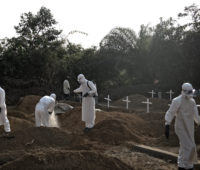Tatiana Carayannis is director of the
Conflict Prevention and Peace Forum (CPPF) and the SSRC’s
Understanding Violent Conflict (UVC) program. She also leads the Council’s China-Africa Knowledge Project and has a visiting appointment at the London School of Economics and Political Science’s Africa Centre and Department of International Development, where she also serves as a research director for the Centre for Public Authority and International Development (CPAID). Until recently, she convened the DRC Affinity Group, a small brain trust of leading Congo scholars and analysts, and served as the Congo research director of the Conflict Research Programme, an international research collaboration. A scholar of UN intervention efforts and peace operations in the Democratic Republic of Congo and in Central Africa more generally, her current research focuses on war networks and the shaping of public authority in Central Africa, and the impact of interventions for justice and security on local communities, including those displaced.
A seasoned researcher, Carayannis has conducted extensive field work in Central Africa, and written widely on political mobilization, rebel governance (the MLC rebel movement in particular), global-local dynamics of violence, international justice, democratic processes and elections, UN peacekeeping and preventive diplomacy, and on the agenda-setting role of UN human rights and development ideas. Before joining the SSRC, she managed a research and publication program on the intellectual history of the United Nations at The City University of New York’s Ralph Bunche Institute for International Affairs. In 1998, she served as rapporteur for the UN secretary-general’s Resource Group on the DRC. Her first book (coauthored) is
UN Voices: The Struggle for Development and Social Justice (with Thomas G. Weiss, Louis Emmerij, and Richard Jolly; Indiana University Press, 2005) and her second (co-edited) is
Making Sense of the Central African Republic (with Louisa Lombard; Zed Books, 2015). Her third book,
The Third UN: How Knowledge Brokers Help the UN Think (with Thomas G. Weiss) will be published in 2020 by Oxford University Press. Two other book projects are in the early stages:
Pioneers of Peacekeeping: ONUC 1960–1964;
Anatomy of Rebellion: JP Bemba and the Mouvement de Liberation du Congo. She has been interviewed by the BBC, Al Jazeera,
The Financial Times, France 24, among others. Carayannis holds a PhD and MPhil in political science (international relations and comparative politics) from The City University of New York Graduate Center, and an MA in political science from New York University. She was a USIP Jennings Randolph Fellow and Mellon Fellow for Security and Humanitarian Action and has lectured at The City University of NY, the University of Edinburgh, Columbia University, and Adelphi University. Carayannis is fluent in English, French, and Greek, grew up in Central and West Africa, and travels frequently to the region.















